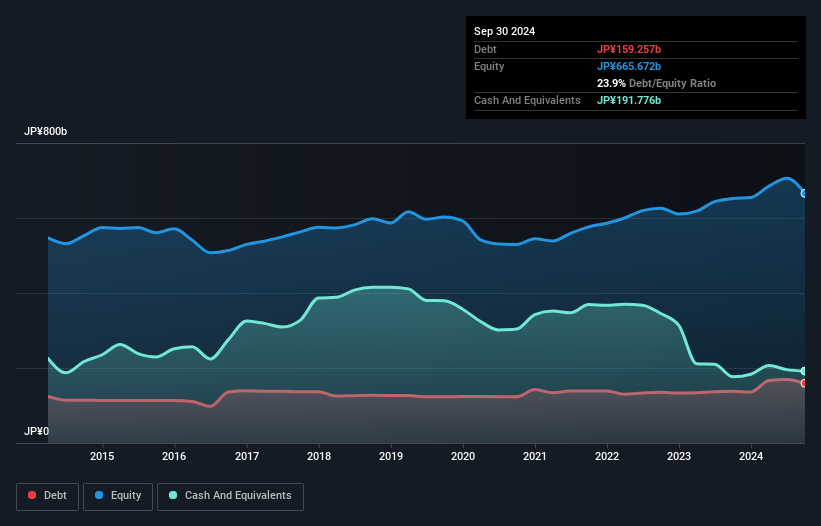Warren Buffett famously said, 'Volatility is far from synonymous with risk.' So it seems the smart money knows that debt - which is usually involved in bankruptcies - is a very important factor, when you assess how risky a company is. Importantly, Nikon Corporation (TSE:7731) does carry debt. But is this debt a concern to shareholders?
Why Does Debt Bring Risk?
Debt is a tool to help businesses grow, but if a business is incapable of paying off its lenders, then it exists at their mercy. Ultimately, if the company can't fulfill its legal obligations to repay debt, shareholders could walk away with nothing. However, a more usual (but still expensive) situation is where a company must dilute shareholders at a cheap share price simply to get debt under control. By replacing dilution, though, debt can be an extremely good tool for businesses that need capital to invest in growth at high rates of return. The first thing to do when considering how much debt a business uses is to look at its cash and debt together.
See our latest analysis for Nikon
How Much Debt Does Nikon Carry?
You can click the graphic below for the historical numbers, but it shows that as of September 2024 Nikon had JP¥159.3b of debt, an increase on JP¥137.7b, over one year. However, its balance sheet shows it holds JP¥191.8b in cash, so it actually has JP¥32.5b net cash.

How Strong Is Nikon's Balance Sheet?
We can see from the most recent balance sheet that Nikon had liabilities of JP¥342.9b falling due within a year, and liabilities of JP¥126.0b due beyond that. Offsetting these obligations, it had cash of JP¥191.8b as well as receivables valued at JP¥114.2b due within 12 months. So its liabilities total JP¥162.9b more than the combination of its cash and short-term receivables.
While this might seem like a lot, it is not so bad since Nikon has a market capitalization of JP¥577.9b, and so it could probably strengthen its balance sheet by raising capital if it needed to. However, it is still worthwhile taking a close look at its ability to pay off debt. While it does have liabilities worth noting, Nikon also has more cash than debt, so we're pretty confident it can manage its debt safely.
It is just as well that Nikon's load is not too heavy, because its EBIT was down 27% over the last year. When it comes to paying off debt, falling earnings are no more useful than sugary sodas are for your health. When analysing debt levels, the balance sheet is the obvious place to start. But it is future earnings, more than anything, that will determine Nikon's ability to maintain a healthy balance sheet going forward. So if you're focused on the future you can check out this free report showing analyst profit forecasts.
Finally, while the tax-man may adore accounting profits, lenders only accept cold hard cash. While Nikon has net cash on its balance sheet, it's still worth taking a look at its ability to convert earnings before interest and tax (EBIT) to free cash flow, to help us understand how quickly it is building (or eroding) that cash balance. During the last three years, Nikon burned a lot of cash. While that may be a result of expenditure for growth, it does make the debt far more risky.
Summing Up
While Nikon does have more liabilities than liquid assets, it also has net cash of JP¥32.5b. So while Nikon does not have a great balance sheet, it's certainly not too bad. The balance sheet is clearly the area to focus on when you are analysing debt. However, not all investment risk resides within the balance sheet - far from it. For instance, we've identified 2 warning signs for Nikon that you should be aware of.
If, after all that, you're more interested in a fast growing company with a rock-solid balance sheet, then check out our list of net cash growth stocks without delay.
Valuation is complex, but we're here to simplify it.
Discover if Nikon might be undervalued or overvalued with our detailed analysis, featuring fair value estimates, potential risks, dividends, insider trades, and its financial condition.
Access Free AnalysisHave feedback on this article? Concerned about the content? Get in touch with us directly. Alternatively, email editorial-team (at) simplywallst.com.
This article by Simply Wall St is general in nature. We provide commentary based on historical data and analyst forecasts only using an unbiased methodology and our articles are not intended to be financial advice. It does not constitute a recommendation to buy or sell any stock, and does not take account of your objectives, or your financial situation. We aim to bring you long-term focused analysis driven by fundamental data. Note that our analysis may not factor in the latest price-sensitive company announcements or qualitative material. Simply Wall St has no position in any stocks mentioned.
About TSE:7731
Nikon
Manufactures and sells optical instruments in Japan, North America, Europe, China, Thailand, and internationally.
Adequate balance sheet with slight risk.
Similar Companies
Market Insights
Community Narratives




